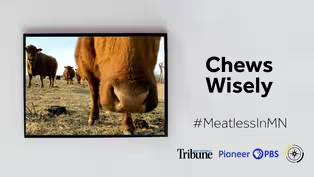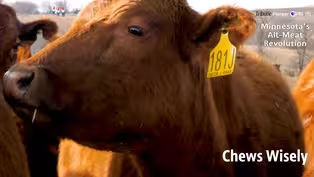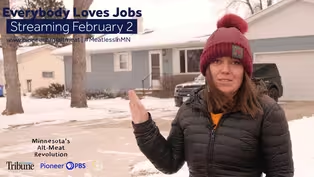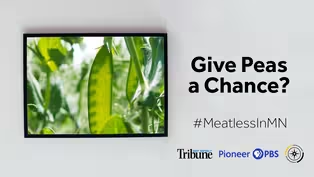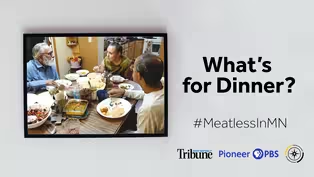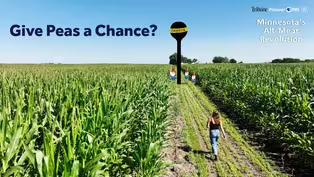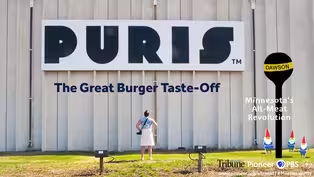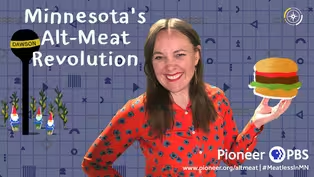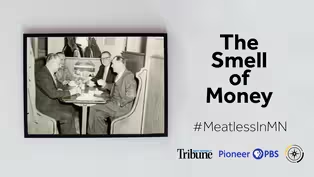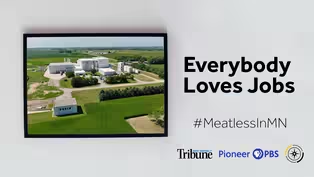Compass
Minnesota's Alt-Meat Revolution: The Great Burger Taste-Off
Clip: Season 7 Episode 1 | 12m 26sVideo has Closed Captions
Learn about PURIS, the largest processor of yellow pea protein in North America.
The second installment of “Minnesota’s Alt-Meat Revolution” dives into the motivations behind PURIS, the largest processor of yellow pea protein in North America. In 2018 and 2019, Cargill invested a combined $100 million in PURIS, which led the company on a path to Dawson, Minnesota. In 2019, PURIS purchased and retrofitted a facility in Dawson.
Problems playing video? | Closed Captioning Feedback
Problems playing video? | Closed Captioning Feedback
Compass is a local public television program presented by Pioneer PBS
Compass
Minnesota's Alt-Meat Revolution: The Great Burger Taste-Off
Clip: Season 7 Episode 1 | 12m 26sVideo has Closed Captions
The second installment of “Minnesota’s Alt-Meat Revolution” dives into the motivations behind PURIS, the largest processor of yellow pea protein in North America. In 2018 and 2019, Cargill invested a combined $100 million in PURIS, which led the company on a path to Dawson, Minnesota. In 2019, PURIS purchased and retrofitted a facility in Dawson.
Problems playing video? | Closed Captioning Feedback
How to Watch Compass
Compass is available to stream on pbs.org and the free PBS App, available on iPhone, Apple TV, Android TV, Android smartphones, Amazon Fire TV, Amazon Fire Tablet, Roku, Samsung Smart TV, and Vizio.
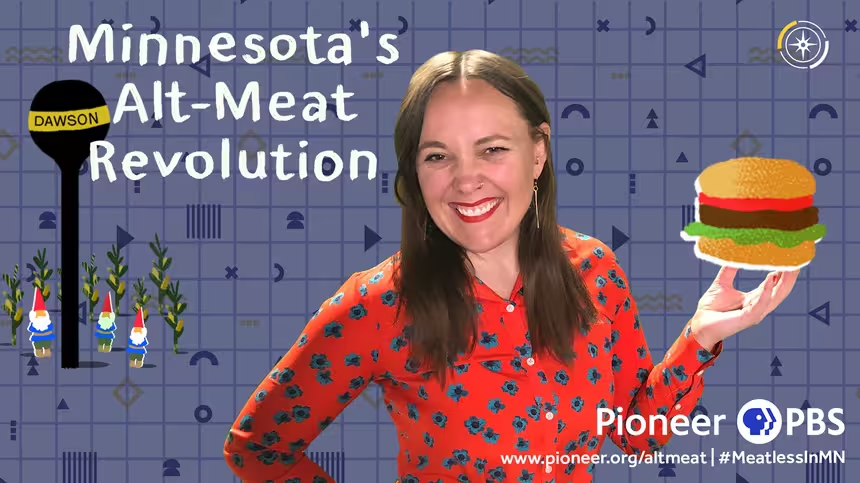
Minnesota’s Alt-Meat Revolution
“Minnesota’s Alt-Meat Revolution" is a year-long video and print journalism collaboration project, looking into the roots and impact of the plant-protein phenomenon that’s exploding across the globe.Providing Support for PBS.org
Learn Moreabout PBS online sponsorship(air whooshing) (birds chirping) - If I had to survive off of plant-based burgers, if it was my only choice, I could survive off eating 'em, you know.
But me as a carnivore my whole life, pretty much, I still would prefer the beef over the plant-based.
(upbeat music) But now if I needed to change my diet, eat some healthier, I would definitely go into a plant-based burger.
- John's sentiments on plant-based proteins are pretty common amongst locals in southwest Minnesota.
The rural town of Dawson is very much a meat and potatoes community.
So it seemed a little ironic when I learned that southwest Minnesota has facilities owned by a couple of influential plant-based protein companies.
Like Eat Just has a plant in Appleton that has the capacity to put out 29 million plant-based eggs per month, the most in the world.
And in Dawson, Minneapolis-based Puris opened the largest operating yellow field pea processing plant in North America.
Puris caught the eye of ag giant Cargill, and by 2019, Cargill had invested $100 million in the company.
So what is Puris?
And how did pea protein make its way to Dawson?
(upbeat music) The Rusty Duck has been a popular bar and restaurant here in Dawson for 14 years.
(bright upbeat music) Situated just a few miles from Puris, co-owner Tom Beals remembered what it was like when Puris first moved to town.
- Tons of contractors.
It would be nuts in here.
Our place was full of steel workers, electricians, you name it.
They were-- - Yeah.
- Yeah, it was great for business for a long time.
- [Host] I wasn't there, but the way that Tom described it, it was fun, it was exciting.
Something new was coming to town and to The Rusty Duck menu came something Tom never could have imagined.
- Now we got a veggie burger.
- [Host] Veggie burgers.
- We put it on the menu after Puris had started here.
I pretty much just decided it was a good business decision to support them and what they were doing and put it on the menu.
And if people want it, were asking for it anyway, then let's roll with it.
- Why do you think more and more people are asking for veggie burgers?
- I don't.
It just seems like it's more of the way now that people are looking for plant-based food, even out here in this economy.
(bright twangy music) - [Host] So can you tell me what brings you here today?
- Just only place in town I can get a plant-based burger.
I swapped to a plant-based lifestyle about five, six years ago.
- Why?
- Health.
- [Host] Kenyon is the environment health and safety manager for Puris, and just happened to be grabbing lunch in The Rusty Duck.
His was the only veggie burger ordered for lunch that day.
Tell me about your veggie burger.
What do you get on it?
What's your favorite?
How do you like it prepared?
- [Kenyon] Typically just take 'em off of a grill.
Pretty basic.
Lettuce, onions, ketchup.
- [Host] The challenge Puris sees for the future of food is creating a product that's plant-based, nutritional, and, maybe most importantly, tastes good.
- When we founded the business, and I say we super generally because I was two, when my parents founded the business back in 1985, we had nothing.
It was started in our basement and my dad said that we were gonna create a plant-based food company.
- [Host] And that was a revolutionary idea in the 1980's.
Nicole's parents, Jerry and Renee Lorenzen, thought that a food system that feeds animals to feed humans was inefficient and unsustainable.
So they thought to take out the middle cow and directly feed people nutrient rich plants.
- So his belief was that if people are gonna eat plants then the plants need to taste good.
And so at a very young age, my brother and I, we really had to pull our weight.
We grew up working in the fields.
We had test plots kind of all around the Midwest.
Maybe 10 acres, 20 acres, but they'll have thousands of varieties in 'em.
And so, we grew up cross pollinating plants to make new varieties.
We did that all the way through college.
My dad, we're from southern Iowa, he planted one of his test plots in Ames, in the town I went to school in, so that I could still do the crossing that summer.
- Definitely a dad power move.
But like many kids, Nicole wasn't 100% sold on taking on the family business.
She did know she wanted to help people.
- And in my professional career, we were working on trading devices that treated cardiovascular diseases.
And the thing that always kind of stopped me was that diet and exercise would prevent a lot of these things for a lot of people.
And there's so much power in the food that we eat and how it impacts our, you know, our health and our longevity.
And that was really, for me, when I came back to the family business, I saw an opportunity to take what I had learned in this other field and start applying it earlier in people's lives.
- [Host] Puris has 225 employees and is trying to compete with giant multinational food companies.
Their special sauce has been the yellow field pea.
- And so, when we created our pea protein, which was commercialized in 2015, it was very novel onto the market in North America.
And that set us on, you know, really what happened over the next, you know, almost 10 years, which has been this incredible journey of pea protein taking the market by storm.
It's had a complete revolution over the past three years.
When that happened, we had already invested into our second facility.
And that's the facility in Dawson, Minnesota, which is one of the largest and most state-of-the-art pea protein processing plants, you know, in the world.
- [Host] This is around the time that Cargill was like, "Here's $100 million, Puris, keep it up."
And Dawson was also like, "Yeah, keep it up."
Because that building had been vacant from 2014 until Puris bought it in 2019.
- It was good to see that something was going to use that plant.
I just didn't, was surprised that how big a transition they did out there from a milk plant to what it is now.
- One of the reasons Puris set up in Dawson was this building built by Dawson Mills in the late 1970s.
It's been the home for several food producing companies, some that even did plant protein processing before it was as popular as it is today.
- I'm Randy Tensen, I'm the mayor of Dawson.
I'm also have ownership of the barbershop in Dawson and it's been here for 37 years.
- [Host] Randy is a busy guy.
As you can see, we caught up with him in the middle of a cut.
- So my name's John Parsons.
I work out at Puris here in Dawson.
- How often do you get your haircut?
- Once or twice a month.
- Do you come here usually?
- Ever since I moved to town, I come here.
- And how does his hair behave for you?
- He got really thick hair, so it's really easy.
- [Host] John is an instrumentation and electrical technician.
He moved to Dawson to work at the new building which processes peas grown all over North America.
The split yellow field peas come here after their cleaned, de-hauled, and split in Puris' facility in Harold, South Dakota.
- So this is our splits receiving and storage.
- [Host] You've heard of split pea soup, yeah?
- You take that outer shell off and it falls into two pieces.
Right?
So we call those splits and what we receive here in Dawson is cleaned yellow split peas.
Once here, we grind them up into a flour put it into a solution and then we do a bunch of separations after that.
- [Host] But why peas?
- A pea consists about 20 to 25% protein - And that's higher than a lot of other legumes or?
- Well, soy actually has a higher protein content but you get the allergens that come along with that.
And another thing about pea protein that makes it a little more attractive are taste and texture.
So, our customers have found that pea protein has a different mouth feel.
- [Host] While people have been able to consume Puris' pea protein and partner companies products, most notably as the pea protein ingredient in Beyond Meat products.
Puris only recently came full circle with their business with the 2022 launch of their own food line, Acremade.
- I personally have an an egg allergy and so, for me, it's something that I always wanted.
And so, we put our team on how can we create awesome plant-based eggs from peas.
- What we're gonna do here is we're gonna showcase the powdered Acremade egg substitute in a scrambled egg format and we're gonna put it on some avocado toast.
So.
Our product itself is shelf stable.
So for somebody who isn't necessarily looking to like get rid of their eggs within like a couple of weeks or so, this is something that can last a year to two years.
So.
- The zombie apocalypse.
- If zombie apocalypse happen, these will be in all the bunkers, for sure.
So, we have the powder here and then from here, we're gonna add some cold water.
(upbeat music) - You wanna cheers?
- Cheers.
- Cheers.
(upbeat music) - It's good.
(upbeat music) - Our dad really challenged our team to say, you know, if we can make pea protein taste just as good as any other proteins on the market, then we might have something.
- [Host] Taste is so important.
So what do people in Dawson think of the plant-based burger now?
Who better to ask than one mayor and one bar owner who have never tried a veggie burger before?
(upbeat music) - Whoa, you're just diving in.
- Oh, yeah.
- Put both burgers on the char boiler, cooked them both exactly the same.
And I put different colored picks in them to be able to tell the difference between the two.
- Which are you gonna try first?
So you tried the right one.
- [Randy] I tried this one.
- So you try your right one first.
- Okay.
- [Host] I'll try my right one first.
- I'm pretty sure which one is which.
- Interesting.
Just a facial expression we have.
- That's a very good tasting burger.
This is the beef, this is all plant and this one is really good.
- [Host] What do you think, Tom?
- They're both very good.
I think I would guess what one is the beef and what one is the veggie burger.
- Oh, yeah?
- Yep.
- That is the real meat.
And that's the plant-based.
- So you had it right.
- Yep, yep.
And that's the plant-based and that's the real meat.
- So you both had it.
- Yep.
We both had it right.
Yep.
- Yep.
I was expecting it to have a taste that was pretty bland, you know, and think about ground up peas and I was just, in my opinion, I would've thought it would be more of a bland.
- And I even think the texture's-- - Amazingly similar.
- quite amazingly similar.
It is very, I mean it.
- So is this the first veggie burger either of you have ever eaten?
- Yep.
- Yep.
First one I ever had.
- Whole entire life?
- Yep.
- And it was excellent.
- This is it?
- Yep.
- Yes.
- I'm so glad I could be here for this one.
Today's plant protein companies seem to have figured out the main problem that plagued the companies trying to popularize plant-based protein in the 70s and 80s.
Taste.
And so much of how plants taste come from how seeds are developed and grown.
In order for any protein operation, plant-based or not, to be successful, it comes back to the growers because without farmers, there's no plant-based egg for your avocado toast.
And that would be devastating.
In our next episode, we'll meet some growers who explain why they do or do not grow the Puris bred yellow field pea.
(upbeat music)
Minnesota's Alt-Meat Revolution: Chews Wisely
Video has Closed Captions
Clip: S7 Ep1 | 11m 39s | Learn about the regenerative potential of beef cattle from two Minnesota farmers. (11m 39s)
Minnesota's Alt-Meat Revolution: Chews Wisely
Preview: S7 Ep1 | 30s | Explores the impact of the food that we eat on soil quality. (30s)
Minnesota's Alt-Meat Revolution: Everybody Loves Jobs
Preview: S7 Ep1 | 30s | In episode five of Minnesota’s Alt-Meat Revolution, we explore the impact of PURIS. (30s)
Minnesota's Alt-Meat Revolution: Give Peas a Chance?
Video has Closed Captions
Clip: S7 Ep1 | 12m 57s | Find out why farmers do — and do not — grow PURIS' yellow field pea. (12m 57s)
Minnesota's Alt-Meat Revolution: What's for Dinner?
Video has Closed Captions
Clip: S7 Ep1 | 11m 27s | Has the presence of PURIS driven people in Dawson to eat more plant-based proteins? (11m 27s)
Minnesota's Alt-Meat Revolution: Give Peas a Chance?
Preview: S7 Ep1 | 30s | A farmer who grows peas for PURIS in ND and why there aren’t more peas grown in MN (30s)
Minnesota's Alt-Meat Revolution: The Great Burger Taste-Off
Preview: S7 Ep1 | 30s | Learn about PURIS, the largest processor of yellow pea protein in North America. (30s)
Minnesota's Alt Meat Revolution
Preview: S7 Ep1 | 30s | How will the small ag town of Dawson, MN be impacted by the plant-based protein revolution (30s)
Minnesota's Alt-Meat Revolution: The Smell of Money
Video has Closed Captions
Clip: S7 Ep1 | 11m 51s | What can be learned by looking at Dawson’s early advances in the plant-based marketplace? (11m 51s)
Minnesota's Alt-Meat Revolution: Everybody Loves Jobs
Video has Closed Captions
Clip: S7 Ep1 | 9m 19s | PURIS brought 100 new jobs to Dawson, but is there more to sustainable community growth? (9m 19s)
Providing Support for PBS.org
Learn Moreabout PBS online sponsorship
- News and Public Affairs

Top journalists deliver compelling original analysis of the hour's headlines.

- News and Public Affairs

FRONTLINE is investigative journalism that questions, explains and changes our world.












Support for PBS provided by:
Compass is a local public television program presented by Pioneer PBS
